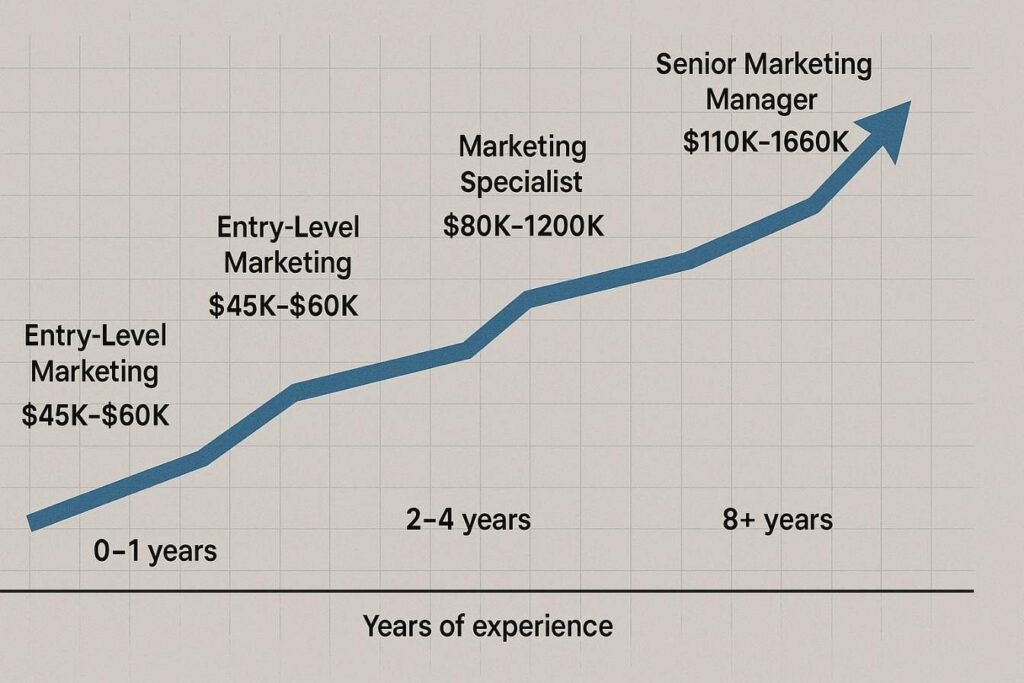An entry level marketing career represents your gateway into one of today’s most dynamic and rapidly evolving professional fields. These positions require little to no prior marketing experience and typically demand an Associate or Bachelor’s degree in Marketing or a related discipline. Entry-level marketing professionals assist with developing strategies that enhance promotional efforts, build specific skill sets, and gain crucial experience needed for long-term success in sales and marketing. From digital marketing specialists to social media coordinators, these roles offer diverse pathways to launch your marketing journey while providing hands-on experience with campaign development, client interaction, data analysis, and strategic planning that translates seamlessly into mid-level and senior positions.
Understanding Entry Level Marketing Career Fundamentals
What Defines an Entry Level Marketing Career?
Entry-level marketing jobs are specifically designed positions that welcome professionals with minimal industry experience. These roles serve as stepping stones into the broader marketing ecosystem, offering structured learning opportunities while contributing meaningfully to organizational goals. Unlike senior positions that demand extensive portfolios and proven track records, entry-level roles focus on potential, educational background, and transferable skills.
The beauty of an entry level marketing career lies in its accessibility and diversity. Companies often accept candidates with experience in similar fields, such as sales, as substitutes for formal marketing education. This flexibility opens doors for career changers and recent graduates alike, creating multiple entry points into the profession.
The Modern Marketing Landscape for New Professionals
Today’s marketing environment differs significantly from traditional approaches, with digital transformation reshaping how brands connect with audiences. Entry-level marketers enter a field where data-driven decision making, social media engagement, and content creation form the foundation of successful campaigns. This evolution has created more specialized entry-level positions while maintaining the core principle of learning through practical application.
The contemporary marketing landscape emphasizes adaptability and continuous learning, making it essential for new professionals to embrace change and proactively acquire new skills. This dynamic environment ensures that entry-level marketers not only stay relevant but also contribute to organizational innovation and growth from their very first day.
Top Entry Level Marketing Career Opportunities
Core Entry Level Marketing Positions
The entry level marketing career landscape offers numerous pathways, each catering to different interests and skill sets. Marketing coordinators represent one of the most comprehensive entry points, serving multiple responsibilities including research, planning, and analysis. These professionals handle competitive analysis, sales forecasting, media placement, campaign implementation, and report compilation.
Account coordinators function as vital links between clients and marketing teams, managing specific client relationships while ensuring deadline adherence and customer satisfaction. This role demands excellent organizational and communication skills, making it ideal for individuals who thrive in client-facing environments.
Social media coordinators have emerged as essential positions in the digital age, focusing on platform-specific best practices, audience targeting, and community building. These professionals create content calendars, manage brand voice across platforms, and respond to audience feedback to foster brand loyalty and drive conversions.
Specialized Entry Level Marketing Roles
| Position | Key Responsibilities | Skills Required |
|---|---|---|
| SEO Specialist | Keyword research, content optimization, analytics | Technical SEO, Google Analytics, Content strategy |
| Marketing Analyst | Data interpretation, campaign performance, reporting | Statistical analysis, Excel, Data visualization |
| Communications Specialist | Brand messaging, PR coordination, content creation | Writing, media relations, Brand management |
| Media Assistant | Campaign planning, media buying, performance tracking | Media planning, Budget management, Analytics |

Emerging Entry Level Marketing Career Paths
The digital revolution has created new opportunities within the entry level marketing career spectrum. Content marketing specialists focus on creating engaging, valuable content that resonates with target audiences across multiple formats including blog posts, videos, infographics, and podcasts. These roles require both creative writing abilities and understanding of content distribution strategies.
Email marketing coordinators manage one of the highest ROI marketing channels, developing automated campaigns, segmenting audiences, and analyzing performance metrics. Similarly, paid advertising specialists handle pay-per-click campaigns across platforms like Google Ads and social media, requiring analytical thinking and budget management skills.
Essential Skills for Entry Level Marketing Career Success
Digital Marketing Proficiency
In today’s landscape, digital marketing proficiency serves as the backbone of any successful entry level marketing career. New professionals must navigate various digital platforms effectively, understand SEO principles, and craft engaging social media content. Mastering email marketing, pay-per-click advertising, and analytics tools has become crucial for reaching and engaging target audiences in our increasingly connected world.
Digital proficiency extends beyond basic platform knowledge to include understanding of customer journey mapping, conversion optimization, and multi-channel campaign coordination. Entry-level marketers who demonstrate competency across these areas position themselves for rapid career advancement and increased responsibility.
Data Analysis and Interpretation Capabilities
Data forms the bedrock upon which modern marketing decisions are made. Entry-level marketers must develop skills in data analysis and interpretation to derive actionable insights that drive campaign optimization and resource allocation. This involves understanding key performance indicators (KPIs), utilizing data visualization tools, and drawing meaningful conclusions from marketing analytics.
The ability to translate complex data into clear, actionable recommendations sets successful entry-level marketers apart from their peers. Companies increasingly value professionals who can demonstrate marketing ROI through data-driven insights and make informed decisions that impact bottom-line results.
Content Creation and Storytelling Mastery
Compelling storytelling represents an art that every entry-level marketer should master. Creating engaging content that resonates with target audiences is essential for building brand awareness and establishing meaningful connections. This skill encompasses not only writing abilities but also crafting visually appealing and shareable multimedia content.

Entry-level marketers should understand the nuances of different content formats and platforms, adapting their approach based on audience preferences and channel characteristics. The ability to maintain consistent brand voice while tailoring messages for specific platforms demonstrates professional maturity and strategic thinking.
How to Land Your First Entry Level Marketing Career
Strategic Job Search Approaches
Finding your first entry level marketing career position requires strategic planning and targeted effort. Consulting with your school’s career center provides valuable resources and connections to potential employers. Career center professionals can inform you of open positions, provide resume feedback, and connect you with alumni working in marketing roles.
Speaking with professors and advisers offers another valuable avenue for job discovery and professional networking. Academic professionals often maintain industry connections and can provide recommendations or introductions to potential employers. Additionally, they understand your academic strengths and can suggest roles that align with your skills and interests.
Leveraging Online Platforms and Networking
Modern job searching extends far beyond traditional application methods. Professional networking platforms like LinkedIn enable direct connections with hiring managers and marketing professionals who can provide insights into company culture and available opportunities. Building a strong online professional presence demonstrates digital literacy and personal branding skills that employers value in marketing candidates.
Industry events, marketing conferences, and professional association meetings provide face-to-face networking opportunities that can lead to job offers and mentorship relationships. Many marketing professionals appreciate helping newcomers enter the field and are willing to share advice and connections.
Building a Compelling Marketing Portfolio
Even without extensive professional experience, aspiring marketers can create portfolios that demonstrate their capabilities and potential. Personal projects, volunteer work, internships, and academic assignments can showcase various marketing skills including content creation, campaign development, and analytical thinking.
| Portfolio Element | Purpose | Examples |
|---|---|---|
| Campaign Concepts | Demonstrate strategic thinking | Mock campaigns for real brands |
| Content Samples | Show writing and creative abilities | Blog posts, social media content, email campaigns |
| Analytics Projects | Prove data analysis skills | Website traffic analysis, social media performance reports |
| Design Work | Display visual communication skills | Infographics, social media graphics, presentation designs |
Building Your Entry Level Marketing Career Foundation
Professional Development and Continuous Learning
The marketing landscape evolves rapidly, making continuous learning essential for entry level marketing career success. Staying current with industry trends, attending workshops, and seeking professional development opportunities ensures relevance and contributes to organizational innovation. This mindset of adaptability and growth distinguishes successful marketers from those who struggle to keep pace with change.
Professional certifications from platforms like Google Analytics, HubSpot, and Facebook Blueprint provide credible skill validation that employers recognize and value. These certifications demonstrate commitment to professional growth while providing practical knowledge that applies directly to entry-level responsibilities.
Establishing Professional Networks
Building meaningful professional relationships forms the foundation of long-term marketing career success. Industry mentorship provides guidance, career advice, and insights into industry best practices that accelerate professional development. Many successful marketers credit mentors with helping them navigate early career challenges and identify growth opportunities.
Joining professional organizations such as the American Marketing Association or local marketing groups provides access to educational resources, networking events, and industry updates. These connections often lead to job opportunities, collaborative projects, and lasting professional relationships that support career advancement.

Setting Career Goals and Milestones
Successful entry level marketing career development requires clear goal setting and regular progress evaluation. Short-term goals might include mastering specific software platforms, completing certification programs, or leading small projects. Long-term objectives could involve specializing in particular marketing disciplines, pursuing advanced education, or transitioning into management roles.
Regular self-assessment helps identify skill gaps and development opportunities while maintaining motivation and direction. Seeking feedback from supervisors and colleagues provides external perspectives on performance and areas for improvement.
Navigating Entry Level Marketing Career Challenges
Common Obstacles and Solutions
Entry-level marketing professionals often face challenges including limited budgets, tight deadlines, and steep learning curves. Developing strong project management skills helps navigate these constraints while delivering quality results. Time management, prioritization, and resource allocation become critical competencies that support professional success.
Imposter syndrome frequently affects new marketing professionals who may feel overwhelmed by industry complexity and rapid change. Building confidence through small wins, seeking mentorship, and focusing on continuous improvement helps overcome these feelings while building professional competence.
Industry Expectations and Performance Standards
Understanding industry expectations helps entry-level marketers set appropriate goals and measure their progress effectively. Marketing roles typically emphasize results measurement, creative problem-solving, and collaborative teamwork. Demonstrating initiative, taking ownership of projects, and contributing innovative ideas showcases professional potential and advancement readiness.
Performance standards often include campaign performance metrics, client satisfaction scores, and project completion rates. New marketers who consistently meet or exceed these standards while maintaining positive working relationships position themselves for rapid career progression and increased responsibilities.
Future Prospects for Entry Level Marketing Career Growth
Career Advancement Pathways
An entry level marketing career serves as the foundation for numerous advancement opportunities across marketing specializations. Marketing coordinators often progress to marketing managers, eventually reaching director or vice president levels. Account coordinators may advance to account management roles, handling larger clients and more complex projects.
Specialization paths include digital marketing management, brand management, product marketing, and marketing analytics leadership. Each pathway offers unique challenges and rewards while building upon fundamental marketing principles learned in entry-level positions.
Salary Expectations and Growth Potential
Entry-level marketing salaries vary significantly based on location, industry, and company size. However, marketing professionals typically experience steady salary growth as they gain experience and demonstrate value to organizations. Performance-based bonuses and commission structures in some roles can significantly increase total compensation.
Professional development investments often yield substantial returns through salary increases, promotion opportunities, and expanded responsibilities. Marketing professionals who continuously update their skills and adapt to industry changes typically outperform peers in both compensation and career advancement.

Maximizing Your Entry Level Marketing Career Potential
Industry Trends and Future Opportunities
The marketing industry continues evolving toward data-driven, customer-centric approaches that create new opportunities for entry-level professionals. Artificial intelligence, marketing automation, and personalization technologies are reshaping how marketers connect with audiences and measure success.
Understanding these trends and developing relevant skills positions new marketers for success in an increasingly competitive landscape. Those who embrace technology while maintaining focus on human connection and storytelling will find the most success in modern marketing environments.
Building Long-term Success Strategies
Long-term success in marketing requires balancing technical competency with creative thinking and strategic planning. Developing expertise in multiple marketing disciplines while maintaining deep knowledge in at least one specialty area provides career flexibility and advancement opportunities.
Successful marketing professionals consistently focus on customer needs, business objectives, and measurable outcomes while remaining adaptable to industry changes and new technologies. This balanced approach ensures sustained relevance and continued growth throughout their careers.
For those interested in exploring broader aspects of marketing careers, our comprehensive guide on Career in Marketing provides additional insights into various marketing pathways and specializations.
Conclusion: Your Entry Level Marketing Career Journey Begins Now
Starting an entry level marketing career represents an exciting opportunity to join a dynamic, constantly evolving field that directly impacts business success and customer experiences. The diverse range of available positions, from marketing coordinators to social media specialists, ensures that professionals with various interests and skills can find fulfilling career paths.
Success in entry-level marketing requires dedication to continuous learning, development of both technical and creative skills, and commitment to understanding customer needs and business objectives. The combination of digital proficiency, data analysis capabilities, content creation skills, and adaptability forms the foundation for long-term career success.
As you embark on your marketing journey, remember that every expert was once a beginner. The skills you develop, relationships you build, and experiences you gain in your first marketing role will shape your entire career trajectory. Embrace challenges as learning opportunities, seek mentorship from experienced professionals, and maintain curiosity about industry trends and innovations.
The marketing field rewards those who combine analytical thinking with creative problem-solving, making it an ideal career choice for professionals seeking variety, growth potential, and the opportunity to make meaningful impacts on organizations and customers alike.
Ready to launch your entry-level marketing career? Explore our additional resources, connect with our marketing community, and take the first step toward your exciting future in marketing. Share your career goals in the comments below and let us know how we can support your marketing journey!




